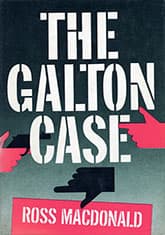The Galton Case
Critique • Quotes
 First edition
First editionFirst publication
1959
Literary form
Novel
Genre
Mystery, crime
Writing language
English
Author's country
United States
Length
Approx. 84,000 words
Where murder leads
It starts as a simple case for a rich old family, as many fictional P.I. cases seem to. Rich old Mrs. Galton wants to find out what happened to her son, whom she has not seen in twenty years—not since he disappeared with the trampy wife she didn't approve of. Lew Archer is expected to go through the motions to satisfy the old dame that the man can't be found, and to pick up an easy fee.
Of course we know it won't be so easy. Otherwise there'd be no story. And we're also not surprised when our intrepid sleuth starts picking up the trail that others missed decades ago.
But we're not quite prepared for where it takes him—and us.
Much of the turf is familiar hardboiled territory: a closed town, corrupt cops, tough guys, tough broads, gangsters and business figures who are hard to tell apart, the well-to-do who affect to float above it all.... But with the discovery of an apparent Galton heir, Archer is led deeper into family history. And not just Galton family history.
Further, he's led to investigate the psychological underpinnings of the crime that twists together two families—families spread so very far apart both geographically and socially.
Reading into it
In his search for the truth, Archer is led from California through Chicago and into Ontario, Canada—tracing backwards through author Macdonald's own life's journey perhaps. Knowing this, a reader cannot help but read more emotional depth into the novel than may first appear in the words alone.
But don't let all this psychological talk put you off. The Galton Case never reads like a treatise or even particularly deep. It's almost the perfect example of a novel working on different levels.
And on the level of a twisting, turning mystery story alone it succeeds. The writing is sharp, clever, though never melodramatic, and always helps the story, tightening up the action where required, and loosening up with witticisms and lyrical musings when we need it.
This author may have a doctorate in literature but he's one accessible writer.
Short words. Short sentences. Lots of dialogue.
Naw, take that back. Not "dialogue". People talking. The way people talk.
And Archer thinking. Thinking the way people talk.
But better.
— Eric
Critique • Quotes

